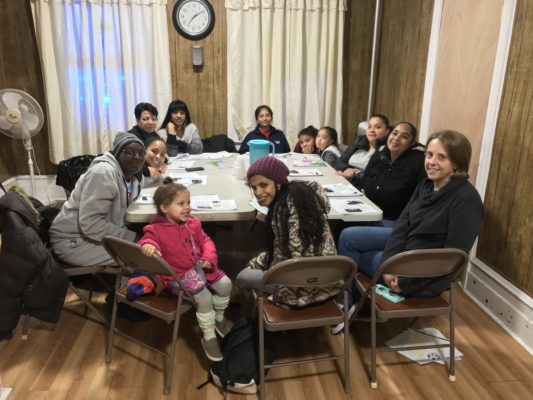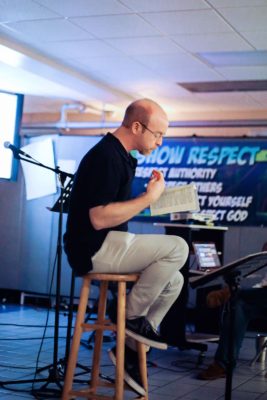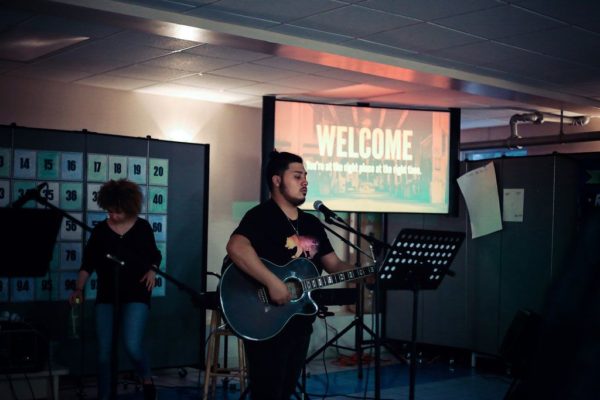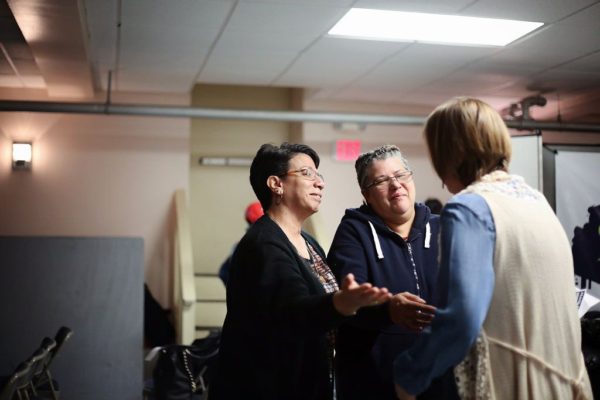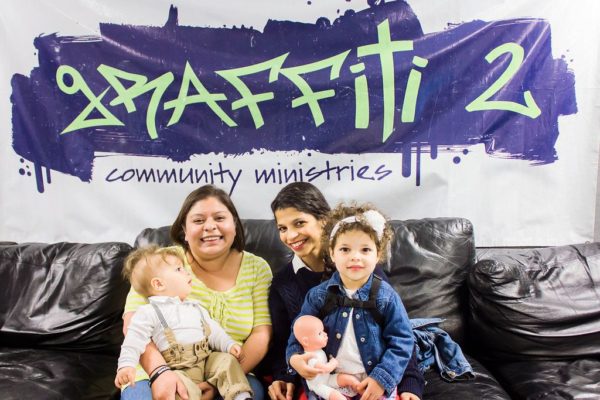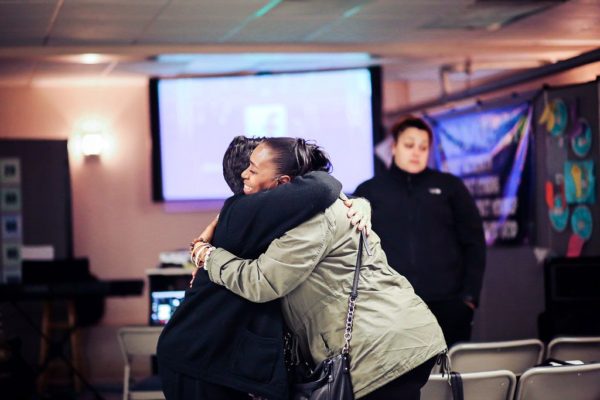Graffiti 2 Baptist Church is a diverse body of believers in the South Bronx. With a myriad of backgrounds we are united by our love for God, our neighborhood, and each other. Following Jesus has changed our lives. Our faith in Him has made us children of God. It has brought us together. It has made us family. We invite you to come and see for yourself! All of our gatherings are casual dress, come as you are.
Worship With Us

WEEKLY SCHEDULE
Worship Service: Sundays at 6:30pm
Small Group Bible Study: Wednesday at 6:30pm
Read Our Covenant, or a summary of what brings us together as a church family.
Read Our Statement of Faith which explains what we believe.
Download Our Church Constitution which is the document that governs our body.
Our Covenant
Having been brought by God’s grace to repent and believe in the Lord Jesus Christ and having been baptized upon our profession of faith, depending upon His Spirit, we resolve to live by faith and so establish this covenant with each other.
We will work and pray for the unity of the Spirit through the bond of peace. (Ephesians 4:3)
We will be devoted to one another in love that is humble, gentle, patient, forgiving, encouraging, and watchful. (Luke 17:3; Colossians 3:13; 1 Thessalonians 5:11; 1 Peter 1:22)
We will not neglect to gather together, or to pray for ourselves and others. (Colossians 4:2; Hebrews 10:25)
We promise to bring up our children and youth in the training and instruction of the Lord and by a pure and loving example seek the salvation of our family and friends. (Ephesians 6:4; 1 Peter 3:1)
We will strive to live a new and holy life, denying ungodliness and worldly passions, as we wait for our blessed hope, the appearing of the glory of our great God and Savior Jesus Christ. (Titus 2:12; 1 Peter 1:14)
We will work together to continue the Gospel ministry in this church through Bible teaching that makes disciples (2 Timothy 4:2); worship that helps us discover our spiritual gifts (1 Corinthians 12); observing the ordinances of believer’s baptism and the Lord’s Supper (Acts 2:38; 1 Corinthians 11:26); sharing financially through this congregation (Luke 12:33; 2 Corinthians 9:7); seeking justice for the vulnerable (Luke 14:13; Isaiah 1:12-17); being a witness to our community, city and world (Matthew 28:19-20; Acts 1:8); and exercising Biblical church discipline (Matthew 18:17; 1 Corinthians 5:13).
We will, when we move from this place, as soon as possible unite with some other church where we can carry out the spirit of this covenant and the principles of God’s Word.
We rejoice when our calling seems impossible, because we know that for God all things are possible. He will do more than we dare ask or think! (Mark 10:27; Ephesians 3:20-21)
Our Statement of Faith
What We Believe:
- In essential beliefs—we have unity
“There is one body and one Spirit—just as you were called to one hope at your calling—one Lord, one faith, one baptism, one God and Father of all, who is above all and through all and in all.” (Ephesians 4:4-6 HCSB)
- In non-essential beliefs—we have liberty
“Accept anyone who is weak in faith, but don’t argue about doubtful issues…Who are you to criticize another’s household slave? Before his own Lord he stands or falls. And he will stand. For the Lord is able to make him stand…So then, each of us will give an account of himself to God…Do you have a conviction? Keep it to yourself before God. The man who does not condemn himself by what he approves is blessed.” (Romans 14:1, 4, 12, 22 HCSB)
- In all our beliefs—we show charity
“If I have the gift of prophecy and understand all mysteries and all knowledge, and if I have all faith so that I can move mountains but do not have love, I am nothing.” (1 Corinthians 13:2 HCSB)
The Essentials We Believe:
- About Scripture
The Holy Bible, specifically the 39 books of the Old Testament and the 27 books of the New Testament, is God explaining Himself to humanity. Written by human writers under the supernatural guidance of the Holy Spirit, God is the author, salvation is its end, and it is truth without any mixture of error. It reveals the principles by which God will judge us and therefore is the true center for Christ-like living until the end of the world.
2 Timothy 3:14-17; 2 Peter 1:19-21; 2 Timothy 1:13; Psalm 119:105, 160; Psalm 12:6; Proverbs 30:5
- About God
There is one and only one living and true God. He is the Creator, Redeemer, Preserver, and Ruler of the universe. God is holy, all-powerful, all-knowing, the source of love and grace, hates sin, and keeps his promises. He is worthy of all possible honor, confidence, and love. God has eternally existed in three personalities: the Father, the Son, and the Holy Spirit. These three have separate personal characteristics. There is no difference in their nature, essence or being.
Genesis 1:1, 26, 27; Genesis 3:22; Psalm 90:2; Matthew 28:19; Mark 1:9-11; 1 Peter 1:2; 2 Corinthians 13:13, 14
- About God the Father
God as Father rules with kind care over His universe, His creatures, and human history according to the purposes of His grace. God is Father to people who become children of God through faith in Jesus Christ. He is fatherly in His attitude toward all humanity.
Genesis 2:7; Matthew 6:9; Matthew 7:11; Matthew 23:9; Matthew 28:19; John 5:26; John 14:6-13; John 17:1-8; Acts 1:7; Romans 8:14-15; 1 Corinthians 8:6; Galatians 4:6; Ephesians 4:6
- About God the Son
Jesus Christ, the Son of God, was completely God and completely human. In Him are God and man brought together. He was brought into being by the Holy Spirit and born of the virgin Mary. He became a human being with all the stress and needs of human beings. Even though He was human, He had no sin. He perfectly respected the divine law by listening to and obeying God. He offered Himself as the perfect sacrifice for the sins of all people by dying on the cross. He arose from the dead after three days to demonstrate His power over sin and death. He ascended to Heaven’s glory where He is now honored at the right hand of God. He is the One Mediator. He now lives in all believers as the living and always present Lord. One day He will return to earth to judge the world and complete His work of salvation.
Isaiah 9:6; Matthew 1:22-23; John 1:1-5; John 14:10-30; Acts 1:9-11; Romans: 1:3-4; 1 Corinthians 15:3-4; 1 Timothy 6:13-14; Titus 2:13; Hebrews 4:14-15
- About God the Holy Spirit
The Holy Spirit is the Spirit of God. The Holy Spirit is present in the world to help humans understand truth, show them their sin, show them the consequence of sin, show the worthiness of Jesus Christ, and call them to Jesus as their Savior. The Holy Spirit is the source of regeneration, living in every disciple from the moment of salvation. The Holy Spirit provides every disciple with power for living, understanding spiritual truth, and guidance in doing what is right. The Holy Spirit provides every disciple spiritual gifts for the purpose of strengthening faith and strengthening the church.
John 14:16-17; John 16:7-13; Acts 1:8; 1 Corinthians 2:12; 1 Corinthians 3:16; 2 Corinthians 3:17; Ephesians 1:13; Ephesians 5:18; Galatians 5:25
- About Humans
Created as male and female, humans are the special creation of God, made in His likeness, and the greatest work of His creation. In the beginning, humans were given the choice to listen to and obey God. Although originally innocent of sin, through the temptation of Satan, humans sinned by disobeying the command of God. Now, although all people have the tremendous potential for good, all of us are marred by an attitude of disobedience toward God. All are guilty of sin. Only the kindness of God can restore humans to His holy fellowship and allow them to complete His creative purpose. Without restoration and salvation, humans willfully separate themselves from God and His goodness, and will therefore face destruction and death, both now and eternally.
Genesis 1:26-30; Psalm 8:3-6; Isaiah 53:6; Isaiah 59:1-2; Romans 3:23; Ephesians 2:1-22; Colossians 3:9-11
- About Salvation
Salvation is God’s free gift to all people who accept it. Sin cannot be atoned for by self-improvement or good works. A person is saved by turning from a self-ruled, sinful life and placing faith in Jesus Christ as Savior and Lord. Salvation includes the whole person (body, mind, and soul) and is never-ending to the true believer. Salvation includes:
- Regeneration—Disciples become new creatures in Christ Jesus. Regeneration is a change of heart created by the Holy Spirit who reveals sin. A disciple turns from sin and turns to God.
- Justification—God’s kind and complete pardon from sin of sinners because of His righteousness. Justification brings the believer into a relationship of peace and approval with God. Justification is achieved only through faith in Jesus Christ.
-
Sanctification—The way a disciple is set apart for God’s purposes. Sanctification grows the disciple in moral and spiritual maturity by the power and presence of the Holy Spirit living within him or her.
- Glorification—The result of salvation. Glorification is the last blessed condition of the believer. This condition never ends for the believer as he or she worships God forever in heaven.
John 1:12; John 14:6; Romans 5:1; Romans 6:23; Galatians 3:26; Ephesians 2:8-9; Titus 3:5
- About Grace
Becoming one of God’s children is the caring work of God. He accepts people just as they are and sets disciples apart for His work. His plan for us to be with Him and worship Him forever does not deny the free will of all people. This plan encourages humility and does not include boasting.
All true believers continue forever and will never lose their salvation. Such persevering attachment to Christ is the mark which distinguishes the true believer from superficial professors. Salvation is by the grace and power of God, not by the self-effort of the disciple. It is this grace and keeping power of God that gives the disciple eternal security. Nevertheless, through sin, disciples harm their lives, harm others’ lives, and harm their own testimony.
Jeremiah 31:3; John 10:29-30; Romans 5:9-10; 2 Timothy 1:12; Hebrews 7:25; Hebrews 10:10, 14; 1 Peter 1:3-5
- About the Church
The New Testament describes the church as the Body of Christ. This church includes all of the believers from throughout history. The local congregation of baptized believers is the visible church of Christ. These disciples are joined by shared agreement of the same faith and share in the fellowship of the Gospel. Together they observe the ordinances of Christ, are governed by His laws, and exercise the gifts, rights, and privileges invested in them by His word. Membership within a local body subjects an individual to loving accountability to that body. Scriptures show a path of love and reproach for an individual that is no longer exhibiting a life reflective of the Gospel. The church’s scriptural offices are Elders or Pastors and Deacons. The qualifications and duties of these offices are defined in the Epistles to Timothy and Titus.
Matthew 16:15-19; Matthew 18:7; Acts 5:11-14; Romans 1:7; 1 Corinthians 5:13; Ephesians 1:22-23; Ephesians 2:19-22; Ephesians 3:8-11; Ephesians 5:22-32; 1 Timothy 3:1-15; Titus 1:5-9; 1 Peter 5:1-4
- About Believer’s Baptism and the Lord’s Supper
Believer’s Baptism is the immersion of a believer in water in the name of the Father, the Son, and the Holy Spirit. It is an act of obedience following the profession of faith. It is both a picture of the disciple’s faith in a crucified, buried, and risen Savior and a picture of the disciple’s death to sin, the burial of the old life, and the resurrection to walk in the newly regenerated life. Baptism is required before church membership and before taking the Lord’s Supper.
The Lord’s Supper is the disciple’s obedient response to Christ’s command to eat the bread and drink the fruit of the vine in order to remember His dying love and look forward to His return. The Lord’s Supper should always be preceded by self-examination.
Matthew 3:13-17; Matthew 26:26-30; Mark 1:9-11; Mark 14:22-26; Luke 22:19-20; Acts 8:35-39; Acts 16:30-33; Romans 6:3-5; 1 Corinthians 10:16, 21; 1 Corinthians 11:17-34
- About Worship, the Sabbath, and the Assembly
Worship is to be given to God and God alone. Worship is anything done for God’s honor in public or in private, corporately or individually. It includes prayer, Bible study, preaching the Word, hearing the Word, teaching, singing, and creative expression. These acts in the absence of seeking justice for those in need do not constitute true worship.
Through God’s example and by his command the Sabbath is given to disciples as one day out of seven for God-centered rest. The disciple should set aside this day to focus attention on God in a special way.
The church body is instructed in scripture to assemble regularly for times of fellowship, corporate worship, and preaching of the word. It is Christian custom for one of such assemblies to take place on the first day of the week as a celebration of the resurrection of Christ from the dead.
Exodus 20: 2-11; Psalm 100; Isaiah 1:16-18; Isaiah 58; Isaiah 61; Micah 6:8; Matthew 12:1-12; Acts 20:7; Romans 14:5-10; 1 Corinthians 16:1-2; Colossians 2:16; Colossians 3:23; Hebrews 10:25
- About the Kingdom
The Kingdom of God includes His general rule over the whole of His creation as well as his rule over people. People of their own free will choose to accept Him as King. The disciple prays and works so that the Kingdom of God may come by His will being done on earth. The Kingdom of God will be complete when Jesus Christ returns to earth again at the end of time.
Isaiah 9:6-7; Matthew 16:27; Matthew 18:8-9; Luke 16:19-26; 2 Corinthians 5:10; Philippians 3:20-21;1 Thessalonians 4:14-18; James 5:8; 1 John 2:28; Jude 14; Revelation 20:1-22:13
- About Eternity
God, in His own time and in His own way, will bring the world to its right end. On that day, Christ will return to earth and the dead will be raised. Christ will judge all people as wicked or righteous. Only those who through faith are justified in the name of the Lord Jesus and sanctified by the Spirit of our God are truly righteous. All others are wicked in his sight. The wicked will be sent to Hell, the place of never-ending punishment. The righteous, in their resurrected and glorified bodies, will receive their reward of endless joy. They will live forever in Heaven with the Lord.
Isaiah 2:4; Isaiah 11:9; Matthew 24:27-44; Mark 9:43-48; 1 Corinthians 4:5; 1 Thessalonians 4:14-18; 2 Thessalonians 1:7; 1 Timothy 6:14; 2 Timothy 4:1-8; Titus 2:13; Revelation 1:18
- About Evangelism and Missions
It is the job and honor of every disciple of Christ and every church to try to make disciples of all peoples. The new birth of a person’s spirit by God’s Holy Spirit means the birth of love for others. It is the duty of every disciple to witness in both word and action.
Matthew 9:37-38; Matthew 10:5-15; Matthew 28:18-20; Luke 10:1-18; John 14:11-12; Acts 1:8; Romans 10:13-15; Ephesians 3:1-11; Hebrews 2:1-3; 1 Peter 2:4-10
- About Education
In Jesus Christ are all the riches of understanding and learning. All truth is God’s truth. The new birth opens all human abilities and creates a desire for learning.
Proverbs 3:13; Ecclesiastes 7:19; Luke 2:40; Luke 2:52; Ephesians 4:11-16; Philippians 4:8; Colossians 2:3-9; Hebrews 5:12-6:3
- About Stewardship
God is the giver of all earthly and heavenly blessings. Disciples have a duty to be good managers of these blessings by serving Him with their time, talents, and possessions. These are all given to the disciple to use for the glory of God and for helping others. Scriptures say that a disciple should give a percentage of their income cheerfully, regularly, carefully, and generously.
Leviticus 27:30-32; Deuteronomy 8:18; Malachi 3:8-12; Matthew 6:1-4; Matthew 19:21; Luke 12:16-21; Luke 16:1-13; Acts 2:44-47; 2 Corinthians 8-9; Philippians 4:10-19
- About Cooperation
Disciples of New Testament churches should help each other to spread the Gospel. Cooperation is wanted between the Christian denominations when the purpose is right, when there is no ignoring of the sense of right and wrong, and when there is no giving up of loyalty to Christ and His Word as explained in the New Testament.
Acts 15:1-35; 1 Corinthians 1:10-17; Galatians 1:6-10; Philippians 1:15-18
- About Justice
All disciples of Christ have a responsibility to make known the will of Christ in their own lives, within the church body, then in the world. The Holy Spirit guides people to the truth and convicts the lost of their sin. Disciples should lovingly rebuke all sin, personal and cooperate, public and private. The ways and methods used to improve society and to create righteousness among people can be very helpful. These changes are helpful only if they lead to or come because of the rebirth of the person by the saving grace of God in Jesus Christ. Disciples should work to provide for the vulnerable.
Isaiah 58; Micah 6:8; Matthew 5:13-16; Luke 4:18-21; Romans 12-14; James 1:27; James 2:8
- About Peace
It is the duty of every disciple to try to find peace with all people. In keeping with the character and teachings of Christ, disciples should be peacemakers, doing everything they can to put an end to conflict, violence, and war. The true solution for conflict, violence, and war is the Gospel of Jesus Christ.
Isaiah 2:4; Matthew 5:9; Matthew 5:38-48; Matthew 6:33; Matthew 26:52; Luke 22:36-38; Romans 12:18-19; Romans 13:1-7; Romans 14:19; Hebrews 12:14; James 4:1-2
- About the Family
God has planned the family as the first institution of the world. It is made up of persons joined to one another by marriage, blood, or adoption.
Marriage is the joining of one man and one woman with the promise of being faithful to one another for a lifetime. Marriage gives the man and the woman the way for intimate friendship. Marriage is the way of sexual expression according to Scripture.
The marriage relationship shows the way God relates to His people. A husband is to love his wife as Christ loved the church. He has the God-given duty to provide for, to protect, and to guide his family. A wife is to submit herself with kindness to the servant leadership of her husband. A wife submits just as the church willingly submits to the leadership of Christ. Both being made in God’s likeness, the husband and wife are equals.
Children, from the moment of creation, are a blessing and inheritance from the Lord. Parents are to show to their children God’s example for marriage. Parents are to teach their children spiritual and moral values. Parents are to guide their children to make choices based on Biblical truths. Parents are to guide their children by living a life faithful to God. Parents are to guide their children with loving discipline. Children are to respect and obey their parents.
Genesis 1:26-28; Genesis 2:15-25; Genesis 3:1-20; Exodus 20:12; Deuteronomy 6:4-9; Joshua 24:15; Psalms 51:5; Proverbs 6:20-22; Matthew 5:31-32; Matthew 18:2-5; Mark 10:6-12; Romans 1:18-32; 1 Corinthians 7:1-16; Colossians 3:18-21; 1 Timothy 5:8; 2 Timothy 1:3-5; Titus 2:3-5; Hebrews 13:4


